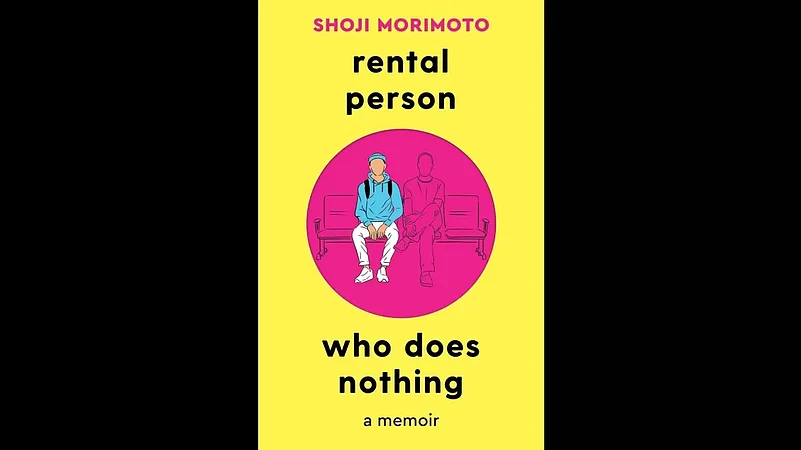Rental Person Who Does Nothing: A Memoir by Shoji Morimoto
Translated by Don Knotting
Published by Picador

“Excuse me, I may have sex today so could you send me a message at 12 to tell me to cut my nails?” – This absurd question was posed by a complete stranger to Shoji Morimoto, a Japanese man in his late 30s, who quit his ‘bullshit job’ to become a ‘rental person’.
One could ponder: How hard would it be for the stranger to just set a reminder on their phone? But in a world that is obsessed with technology, so much so that it almost causes fatigue, maybe the stranger just did not want to feel lonely. Maybe they just wanted to feel the presence of another person.
The first page of his memoir Rental Person Who Does Nothing describes this ‘job’ and the many functions he serves. ‘Maybe there is a restaurant you want to go to, but you feel awkward going on your own. Maybe a game you want to play, but you are one person short. Or perhaps you’d like someone to keep a space in the park for your cherry blossom viewing party…I can’t do anything except give very simple responses’: This is what a ‘Rental Person’ does. He hangs around with people who want company, watches them while they eat, run errands, or simply rant about their failed relationship. That is his daily job – in a brutal capitalist world where people chase high levels of productivity in return for a meagre salary.
Morimoto switched multiple professions before he decided to not succumb to the conventional pressures of being an employee. From working in the education industry to being a freelance writer, he always found himself wanting more but to do less. He was tired of his toxic boss whose daily taunts to him ranged from “I can’t tell if you’re alive or dead” to “You’re a permanent vacancy.”
“You accept one assignment and you end up doing a series on the same subject, or you are asked to do something very familiar for another company in the same field. People are always looking for a good result to be repeated. It was stressful to have to meet expectations.”
His blunt description of his then-daily job as a freelance writer made it very clear that he found the whole concept of working for a boss and a salary, very depressing. Almost immediately into the beginning of the memoir, Morimoto resists such traditional ‘bullshit jobs’, in the language of David Graebar.
Using Twitter (now X) as his launchpad, Morimoto began his venture (he’s still very much active on it). He makes it very clear that he isn’t like “Pro-Ogorareya”, a 24-year-old man on X who lives off others by offering himself up for odd jobs. Morimoto does not accept money in return for providing company. But he doesn’t put much effort into it either. “I can’t do anything except give very simple responses,” he makes it clear, multiple times. If an assignment requires him to participate actively, he refuses it.
His memoir doesn't take the form of narrative storytelling; instead, it is an extensive catalog of the myriad requests he received – some completely mind-numbingly banal and mundane and others exposing the desperate need of people to not be alone. As many as 1.5 million people live as social loners or hikikomori in Japan. One client wanted to rent Morimoto for a day because had been living alone for so long that he’d forgotten what it was like for there to be someone else in his space.
Morimoto’s resistance to the evils of capitalism might seem utopian. But it isn’t as unimaginable in a country like Japan where karoshi, or death by overwork, is widely prevalent. Miwa Sado, who worked at the broadcaster’s headquarters in Tokyo, logged over 150 hours of working overtime and took only two days off in the month leading up to her death from heart failure in July 2013. A labour standards office in Tokyo later attributed her death to karoshi. Matsuri Takahashi was 24 when she killed herself in April 2015. Labour standards officials confirmed that her death had been caused by stress owing to long working hours. Takahashi had been working more than 100 hours overtime in the months before her death.
Morimoto saw these evils up close. Over the course of his memoir, he talks about his older brother who failed his university exams, became depressed, and, although over 40, had never been able to work. His older sister was unable to find the kind of job she craved and ended up killing herself. While from the society’s point of view, his siblings were not ‘productive’ or of ‘value’, but for Morimoto, they had value because they simply existed.
So Moromito does nothing, contributes nothing, just exists and lives a stress-free life. “I’d like the world to be one where even if people can’t do anything for others, even if they can make no contribution to society, they can still live stress-free lives,” he writes in his memoir.
The requests are pasted verbatim from X, and are then followed by his responses, making for an easy read. However, while the requests might sound monotonous on paper, Morimoto never gets fed up with the role. Why? There are millions of people in the country, who lead different lives and want to rent him for different situations. He felt comfortable in a community that existed just for those few hours, with simple, temporary relationships uncomplicated by past or future.
Although he portrays himself as a ‘lazy do-nothing’ person, his acts of accepting people’s strange requests, just to keep them company, shows that he is very generous and kind. While to be a rental person without charging a fee could be a daunting task and a less economical way of living life in other parts of Asia, doing nothing did prove to be a success for him so much so that he wrote a book about how he came to be the famous Rental Persoon Who Does Nothing.


























